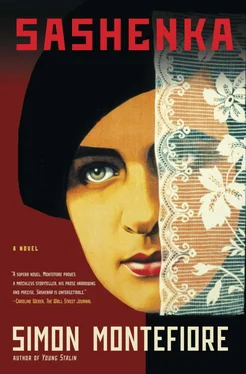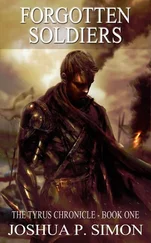She walked slowly toward home down the famous avenues, now seething with dark figures. Bonfires were lit in the streets. Urchins danced around the flames like demonic gnomes. An arsenal had been stormed: workers now carried rifles. She tramped onward, exhausted yet vibrating with fear and excitement. Whatever Uncle Mendel claimed about the Revolution, the people had not melted away at the first sign of resistance. There was the crackle of more shooting. Two boys, young workers, kissed her on both cheeks and ran on.
She came upon a crowd of soldiers on Nevsky. “Brothers, sisters, daughters, mothers, I propose that we don’t fire on our brethren,” shouted some NCO to cries of “Hurrah! Down with the autocracy!” She tried to find her comrades but they were at none of the coachmen’s cafés or the safe houses on Nevsky.
Hurrying on, Sashenka felt wildly joyful. Was this it? A revolution without leaders? Where were the machine-gun nests and Cossacks and pharaohs? She heard a roaring engine. The people in the streets froze and watched, raising white faces like moons: what could it be? Like a dinosaur, a grey Austin armored car mounted with a howitzer drove haphazardly, gears screaming, in random accelerations and jerking turns, down Nevsky. The crowd scattered as it mounted the pavement and drove straight over a bonfire outside Yeliseyev’s grocery store, and then stopped beside a group of soldiers.
“Can anyone drive this thing?” shouted the driver.
“I can!” A young man with shaggy black hair and bright brown eyes jumped up. “I learned in the army.” It was her comrade Vanya Palitsyn, the Bolshevik metalworker. Sashenka hurried toward him to ask for instructions but he was already inside the armored car, which revved, shook and then accelerated off down the prospect.
“Are you for the Revolution?” asked a stranger, a boy with a Ukrainian accent, a blue nose and a military jacket. It was the first time anyone had used that word.
“I’m a Bolshevik!” Sashenka said proudly. They hugged spontaneously. Soon she was asking the question herself. Strangers embraced around her: a grizzled sergeant-major, a Polish student, a fat woman wearing an apron under her sheepskin, a leather-clad metalworker in a tool belt, even a fashionable woman in a seal coat. Closer to home, cars filled with soldiers waving banners and rifles skidded down Nevsky and Greater Maritime.
Dizzy with the momentum of this chaotic night, Sashenka kept thinking of Sagan. She was keen to make her report to Mendel. She had got the name of the traitor, established Sagan as a Bolshevik source inside the Okhrana, and was now a fully fledged practitioner of the art of conspiracy. She could hand over the direction of their double agent to another comrade. The mission was over, and away from Sagan and the effect he had on her, she was relieved. The Party would be satisfied.
She racked her brain for other Party safe houses. She tried 106 Nevsky. No answer. Then 134. The door was open. She flung herself upstairs, her senses bristling. The door was just opening and she could hear the Jericho trumpet of Mendel’s voice. “What are we doing?” he was shouting.
“I just don’t know,” replied Shlyapnikov, wearing a padded greatcoat. “I’m not sure…”
“Let’s go to G-g-gorky’s apartment,” suggested Molotov, rubbing his bulging forehead. “He’ll know something…”
Shlyapnikov nodded and headed for the door.
“This is it,” she said. Her voice squeaked, not her own. “The Revolution.”
“Don’t lecture the committee, comrade,” answered Shlyapnikov as he and Molotov clumped down the stairs. “You’re a puppy.”
Mendel lingered for a moment.
“Who’s in charge?” asked Sashenka. “Where’s Comrade Lenin? Who’s in charge?”
“We are!” Mendel smiled suddenly. “Lenin’s in Geneva. We are the Party leadership.”
“I met Sagan,” she whispered. “Verezin the Horse Guards concierge is the traitor. But I don’t suppose it matters anymore…”
“C-c-comrade!” called Molotov from the lobby, stammer reverberating up the stairs.
“I’ve got to go,” said Mendel. “Check the other apartments for comrades. There’s a meeting at the Taurida Palace. Tell them to report there later.”
Mendel limped down the stairs, leaving Sashenka alone.
She returned to Nevsky, heading home. She ate some solianka soup and a chunk of black Borodinsky bread at the carriage-drivers’ café, which was full of workers and coachmen, each telling stories of mayhem, orgies, slaughter, hunger and treason in loud, tipsy voices without listening to anyone else. Coal and oat prices had quadrupled. Even a bowl of soup in the café had gone up seven times. There were German agents, Jewish traitors and crooks everywhere.
As Sashenka put some coins into the barrel organ, which incongruously played “God Save the Tsar,” raising guffaws from the coachmen, the streets grew darker. There were distant sounds like lions coughing in the night, the groan grew into a deafening roar and the hut shook. At first she could not understand why—then she realized that as she had been eating, the coachmen’s café had been surrounded, overrun by a sea of people in dark coats. They were blocking the streets. There was shooting in the distance and smoke rising, pink against the pale darkness: the Kresty Prison was on fire.
As she walked down Greater Maritime, Sashenka saw a soldier and a girl kissing against a wall. She could not see their faces but the man groped up the girl’s skirt past her stocking tops while the girl tore open his fly buttons. A leg rose up his side like one of the Neva’s bridges opening. The girl mewed and writhed. Sashenka thought of Sagan and the sleigh ride in the snowfields and hurried on.
Outside the Astoria, some soldiers were stealing a Rolls-Royce, punching a uniformed chauffeur. The doorman, an officer and a gendarme ran outside, shouting. The soldiers calmly shot the officer and the gendarme, and the car drove off with its horn blowing.
Presently, a bearded man staggered heartily past her singing, “ Nightingale, nightingale, ” with a blond woman in a fur coat and Sashenka recognized Gideon and Countess Loris. She was relieved to find friends and was about to hail them when Gideon cupped Missy’s buttocks and pulled her out of the crowd and into a doorway where they started kissing frenziedly.
A volley of shots distracted Sashenka. Figures were climbing up the façade of the Mariinsky Palace and tearing down the double-headed eagle of the Romanovs.
The gendarme’s body lay in the street, splayed so that his white belly bulged out of his trousers, like a dead fish. Exhausted beyond belief, Sashenka stepped over it and hurried down Nevsky—toward the Taurida Palace.
“What are you all standing around for?” Ariadna called from the top of the stairs, her hair up, elegant in a flounced dress of shantung silk. The faces of Leonid the butler, the two chauffeurs and the parlormaids were raised toward her as she started to descend.
“Haven’t you heard, Baroness?” It was Pantameilion, always the cheekiest, his neat mustache, oiled hair and sharp chin thrusting impertinently.
“Heard what? Speak up!”
“They’ve formed a Workers’ Soviet at the Taurida Palace,” he said excitedly, “and we’ve heard that—”
“That’s yesterday’s news,” snapped Ariadna. “Please get on with your work.”
“And the crowds say…the Tsar’s abdicated!” said Pantameilion.
“Rubbish! Stop spreading rumors, Pantameilion. Go and decarbonize the car,” replied Ariadna. “The baron would know if anyone did—he’s at the Taurida!”
At that moment, the front door opened and Zeitlin swept in, a commanding figure in his floor-length black coat with a beaver collar and shapka . Ariadna and the servants stared open-mouthed as if he alone could settle the great question of the epoch.
Читать дальше












